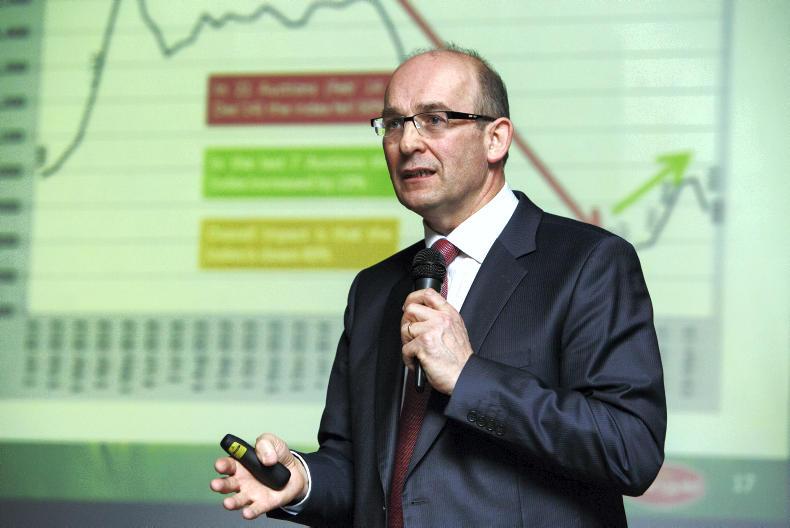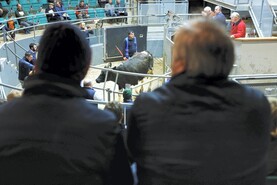The largest farmer-owned co-op in the country supported milk prices by €25m in what was a more challenging year for dairy markets.
Chief executive Jim Woulfe said it “was a year of two halves as far as dairy markets were concerned”, adding that “the first half saw continued volatility with declining market returns while the second half began to see a change in the market dynamic, with global milk output slowing across all regions except the USA”.
Despite a 4.1% increase in milk volumes to 1.2bn litres, turnover decreased 3.7% to €756.1m.
The co-op had a charge of €1.2m relating to restructuring the retail business during the year
The co-op saw operating profit fall 8.8% to €17.5m, which represents a decrease of €1.7m, driven by the increase in supports of €5m to €25m.
The co-op had a charge of €1.2m relating to restructuring the retail business during the year. Earnings (EBITDA) fell 5.3% to €39.0m. Operating margins remained solid and fell marginally from 2.4% to 2.3%.
Dairygold paid a milk price of 27.7cpl (including a 2c/l support) in 2016. From July 2016 onwards, it implemented seven milk price increases.
Dairygold continued to invest in the business and a further €15m was invested in the year. This brings the total capital investment over the past six years to €200m across its dairy sites at Mallow and Mitchelstown. This has seen processing capacity increase by 55% in the same period.
Net asset value
At year end, the net asset value was down by almost €8m to €307.6m. Net debt was reduced by €7.5m during the year and was €88.7m at year end. Net debt to earnings was a comfortable 2.3 times at year end. To date, member funding comprises €11.2m. The revolving fund was suspended in 2016 due to the low milk prices and meant that €7m was not contributed from farmers during the year.
Listen to an interview with Jim Woulfe in our podcast below:
Listen to "Talking performance and price recovery with CEO of Dairygold" on Spreaker.
Dairygold received a final distribution from the winding up of Reox of €411,000 during the year.
Food ingredients saw turnover fall 1.1% to €418m. During the year, Dairygold announced plans to develop a new cheese production facility at Mogeely in partnership with Norway’s largest dairy processor, Tine. This will quadruple Tine’s current cheese output on the site. This arrangement will see Tine building and operating a new facility on the Mogeely site, with milk coming directly from Dairygold. While still at the planning stages, it is hoped that construction will start in 2018.
Turnover in the agri-retail division
Turnover in the agri-retail division was down 4% to €212m, driven by reduced selling prices and fertiliser volumes due to strong grass growth and favourable weather conditions. Retail sales increased in the year. During the year it purchased 107,000t of grain, paying a €10 market support.
Turnover in its overseas business, which includes its UK cheese ingredient business, fell 10% to €122m as a result of negative exchange rates and reduced selling prices, despite strong volume growth.
Woulfe said Brexit will have a profound impact on the Irish dairy and food industry and, in particular, for cheese. He added: “We must continue to pursue strategies to diversify markets to minimise the impact of Brexit.”
Read further analysis and more from Jim Woulfe this Thursday in the Irish Farmers Journal and at www.farmersjournal.ie
Read more
Rebel win for Dairygold
The largest farmer-owned co-op in the country supported milk prices by €25m in what was a more challenging year for dairy markets.
Chief executive Jim Woulfe said it “was a year of two halves as far as dairy markets were concerned”, adding that “the first half saw continued volatility with declining market returns while the second half began to see a change in the market dynamic, with global milk output slowing across all regions except the USA”.
Despite a 4.1% increase in milk volumes to 1.2bn litres, turnover decreased 3.7% to €756.1m.
The co-op had a charge of €1.2m relating to restructuring the retail business during the year
The co-op saw operating profit fall 8.8% to €17.5m, which represents a decrease of €1.7m, driven by the increase in supports of €5m to €25m.
The co-op had a charge of €1.2m relating to restructuring the retail business during the year. Earnings (EBITDA) fell 5.3% to €39.0m. Operating margins remained solid and fell marginally from 2.4% to 2.3%.
Dairygold paid a milk price of 27.7cpl (including a 2c/l support) in 2016. From July 2016 onwards, it implemented seven milk price increases.
Dairygold continued to invest in the business and a further €15m was invested in the year. This brings the total capital investment over the past six years to €200m across its dairy sites at Mallow and Mitchelstown. This has seen processing capacity increase by 55% in the same period.
Net asset value
At year end, the net asset value was down by almost €8m to €307.6m. Net debt was reduced by €7.5m during the year and was €88.7m at year end. Net debt to earnings was a comfortable 2.3 times at year end. To date, member funding comprises €11.2m. The revolving fund was suspended in 2016 due to the low milk prices and meant that €7m was not contributed from farmers during the year.
Listen to an interview with Jim Woulfe in our podcast below:
Listen to "Talking performance and price recovery with CEO of Dairygold" on Spreaker.
Dairygold received a final distribution from the winding up of Reox of €411,000 during the year.
Food ingredients saw turnover fall 1.1% to €418m. During the year, Dairygold announced plans to develop a new cheese production facility at Mogeely in partnership with Norway’s largest dairy processor, Tine. This will quadruple Tine’s current cheese output on the site. This arrangement will see Tine building and operating a new facility on the Mogeely site, with milk coming directly from Dairygold. While still at the planning stages, it is hoped that construction will start in 2018.
Turnover in the agri-retail division
Turnover in the agri-retail division was down 4% to €212m, driven by reduced selling prices and fertiliser volumes due to strong grass growth and favourable weather conditions. Retail sales increased in the year. During the year it purchased 107,000t of grain, paying a €10 market support.
Turnover in its overseas business, which includes its UK cheese ingredient business, fell 10% to €122m as a result of negative exchange rates and reduced selling prices, despite strong volume growth.
Woulfe said Brexit will have a profound impact on the Irish dairy and food industry and, in particular, for cheese. He added: “We must continue to pursue strategies to diversify markets to minimise the impact of Brexit.”
Read further analysis and more from Jim Woulfe this Thursday in the Irish Farmers Journal and at www.farmersjournal.ie
Read more
Rebel win for Dairygold






 This is a subscriber-only article
This is a subscriber-only article










SHARING OPTIONS: